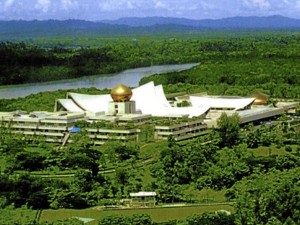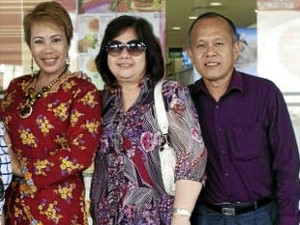Filipinos run schools in Brunei

LANDMARK Istana Nurul Iman Palace was designed by Filipino architect Leandro V. Locsen. It was constructed by Ayala International, a Filipino firm. photo credit: www.reasonpad.com
BANDAR SERI BEGAWAN—Among some 20,000 Filipino professionals and service workers in Brunei, school owners Edel Bartholomew and couple Eden and Edgardo Jusay run thriving businesses built on Filipino talent.
Bartholomew runs a pre-school while the Jusays opened a music school in this kingdom just two hours away from Manila.
For the Brunei-based entrepreneurs, success lies not only in doing well for themselves but in bringing the “bayanihan” spirit to life in the Sultanate.
“Anywhere I go, people really look for Filipino talent. We are really known for that,” said Bacolod-born Bartholomew, who has also spent time in her husband’s native Australia.
In Bartholomew’s Tinkerbell preschool and daycare center, 13 Filipinos, among them teachers and administrative staff, look after some 300 students that include Bruneians, Malaysians, Indonesians, Thais, Indians and some Filipinos.
“I feel like I’m successful in helping other Filipinos. Just imagine, they were working as private teachers in the Philippines, earning P4,500 a month. When they came to Brunei, I paid them $700 (almost P25,000), with free housing and free medical checkups,” she said.
An agronomist, Bartholomew started her school in 2002, inspired by her love for children and the desire to help her compatriots.
“It’s like a tree you plant and let grow. So the two-month old babies before are now sitting in the classroom. There’s that feeling of satisfaction,” said the 50-year-old mother of one.
“And maybe it’s also instinct. I really want to help Filipinos. My teachers are Filipinos. That’s what Bruneians look for,” claimed Bartholomew, also president of the Filipino Association in Brunei (FAB).
The Jusays meanwhile started the Neoclassic Music School in 2005, with daughter Sharon, a music graduate from the University of the Philippines, as principal. The school offers one-on-one short music courses to clients of all ages.
Manned by five teachers, the school now has 200 mostly foreign students, including expatriates from Britain, New Zealand, Australia And India.
“All my teachers are Filipinos,” said Eden Jusay, also a teacher.

BRUNEI EDUCATORS Edel Bartholomew (left), owner of the Tinkerbell preschool; Eden Jusay (center) and husband Edgardo Jusay, owners of Neoclassic Music School. Photo courtesy of Adrian Arias
Asked to what she attributes her family’s success in a foreign land, Jusay replied: “Hardwork and discipline. And of course we are also able to help our fellow Filipinos.”
Filipinos have a big presence in this sultanate (pop. 400,000), working in the fields of engineering, education, media and the service industry, among others. Most every shop or restaurant has a Filipino staffer. The Sultan’s Palace, Istana Nurul Iman, is serviced by a housekeeping staff also dominated by Filipinos.
Speaking of his encounter with the Filipino community here during his recent state visit, President Aquino noted in awe how some 34 Filipino organizations in the Sultanate “never get into fights or get envious of each other.”
Recently, FAB helped bring home a group of Filipino grasscutters who complained of unfair treatment at work. Bartholomew said the workers were forced to labor beyond supposed hours, deprived meals and were not paid on time.
“We work like one family here so were all have a good relationship,” said Bartholomew.